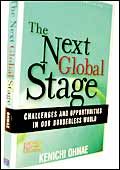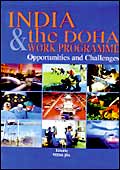 |
THE NEXT GLOBAL STAGE
By Kenichi Ohmae
Pearson Power
PP: 282
Price: Rs 499 |
Whether
we like it or not, globalisation is here to stay. Despite the
World Trade Organization's (WTO) slow crawl, companies and consumers
will increasingly and inexorably cross their own borders to do
business. One man who foresaw this long before most others, is
Kenichi Ohmae. The nuclear engineer from the Massachusetts Institute
of Technology (MIT) and former McKinsey consultant has been talking
of a borderless world for at least two decades now. His first
book on the subject, Triad Power, urged companies to embed themselves
in the triad of Europe, Japan and America to be able to compete
on the global stage. His next book, The Borderless World, published
five years later in 1990, looked at what corporations would need
to compete in a world where economic boundaries were merging.
In the books that followed (End of the Nation State: The Rise
of Regional Economies; and The Invisible Continent), he built
on his globalisation arguments, pointing out, for example, how
clusters of highly competitive regions were emerging within countries
across the world that would be the real engines of growth, and
why in the new scheme of things, capital would always chase the
best return, no matter where it came from.
The Next Global Stage, therefore, is another
attempt by Ohmae to make sense of the rapid changes that are taking
place in the global economy, and how companies, governments, and
even individuals need to respond to it. First off, says Ohmae,
forget all the rules of traditional economics. Why? Most of the
principles, he argues, were developed keeping the nation-state
framework in mind, but now that it is region-states that drive
economies, those principles need to be reconsidered. A high interest
rate, says Ohmae, need not always harm capital investment; it
can be a powerful means of attracting money from other parts of
the world. He cites for example the Greenspan era during Bill
Clinton's administration, when the Federal Reserve kept increasing
interest rates in small doses in the name of cooling an overheated
economy, but all it really wanted to do was get global investors
to put more money into America. Ohmae's suggestion that "the
global economy is new. There is no rulebook. Nobody knows what
will work. The only solution is to try and, if at first you fail..."
may not be too comforting to those looking to the book for a roadmap
for the new era. Still, there's one thing The Next Global Stage
(minus a few typos) will not leave you in doubt of, and that is
just how much the world really has shrunk in the past two decades.
 |
OPPORTUNITIES AND CHALLENGES
Edited By Veena Jha
Macmillan India Ltd.
PP: 378
Price: Rs 595 |
INDIA & THE DOHA WORK PROGRAMME
It is rather unfortunate
that a publication of such importance should have missed the deadline
of the Hong Kong Sixth Ministerial of the World Trade Organization
in December. After all, the Indian objectives at this multilateral
meet were very similar to the basic theme of this book-furthering
the cause of India's interest globally while safeguarding its
domestic interests at the same time. The publication of the book
just weeks after the announcement of the Hong Kong declaration
may have robbed the book of its immediacy, yet it remains a valuable
addition on this subject. India & the Doha does a good job
of not only addressing the critical issues of Doha-agriculture,
non-market agriculture access, services, trade facilitation and
subsidies-in a lucid and reader-friendly fashion, but also focuses
on the country's negotiating stance and its impact. Therefore,
whether you are a trade expert or just a layman trying to come
to grips with the complexities of the Doha talks, this book is
a must read.
|





